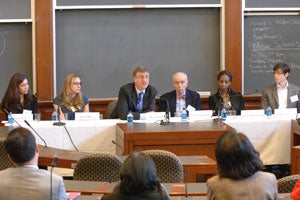On April 24, HLS hosted a panel discussion titled “The International Face of Harvard Law School.” The panel, moderated by Professor William Alford ’77, included John F. Cogan, Jr. ’52 and four current HLS students who described their experiences in the international law program at HLS.
Cogan, a longtime benefactor of the school and especially its international program, offered an overview of how the international studies program has developed over the past decade, including curriculum developments and other initiatives that were designed in consultation with alumni. The panel discussion was part of the Spring HLS reunions weekend program.
Questions covered a broad range of topics, including what programs are currently being offered to students interested in negotiating peace in war-torn countries, the numbers of students who are taking advantage of opportunities to work and study abroad, what emphasis HLS has put on European Union law, and what types of professional opportunities students pursue after graduating.
 Student panelists Reid Monroe-Sheridan ’09, Amaka Megwalu ’10, Anna Myles-Primakoff ’10, and Alejandra Núñez Luna LL.M. ’03, a current S.J.D. candidate, discussed their backgrounds and how they became interested in international legal issues.
Student panelists Reid Monroe-Sheridan ’09, Amaka Megwalu ’10, Anna Myles-Primakoff ’10, and Alejandra Núñez Luna LL.M. ’03, a current S.J.D. candidate, discussed their backgrounds and how they became interested in international legal issues.
Monroe-Sheridan, who has a background in Japanese literature, discussed how HLS has enabled him to pursue his interest in Japanese corporate law. “Even as a 1L I was able to take a course with Professor Alford and Professor [J. Mark] Ramseyer, who’s the Japanese law professor here,” he said. “I felt really fortunate to have a professor who can read Japanese cases and comment on my own analysis and my own understanding of those cases.” In the fall, Monroe-Sheridan will begin working at the law firm Simpson Thatcher. He will eventually work in the firm’s Tokyo office.
Megwalu described her interest in development issues in Africa and her work with non-governmental organizations in several African countries prior to coming to HLS. “I came to law school basically looking for skills that would help me implement structural change, particularly on the continent of Africa,” she said. During the summer after her 1L year, she worked with the African Development Bank in Tunisia, where, she said, “all of the interns were from Harvard Law School.” She described her internship as “a fascinating experience” and said, “I wonder[ed] if I would have gotten the opportunity if I wasn’t here.” HLS also facilitated her trip to Cyprus as a 2L to present a paper at an academic conference.
A joint-degree student at HLS and the Harvard Kennedy School, where she will be receiving a master’s degree in Public Policy, Myles-Primakoff told the audience that, like Megwalu, she was interested in development issues in Africa. Her summer experiences as a law student have included an internship in Liberia, where she worked with legal counsel for the Liberian Ministry on changing and restructuring contract laws, and designing a pilot program for free speech, human rights, and citizenship education. “I’ve taken a lot of international law classes here, there’s just an incredible selection,” she said. “I’ve gotten to travel a lot of different places through Harvard Law.”
Lopez described her experiences as a student in the LL.M. program, from which she graduated in 2003, and as a current S.J.D. candidate. Originally from Mexico, she was interested in the privatization of infrastructure in Latin America—a focus that led to a position at Stanford University working for private investors interested in privatizing the Mexican water system. As an S.J.D. candidate, she has studied Mexican history, even visiting archives in other countries to trace the country’s roots back to medieval times. “I have the privilege of being a student here and having such an array of library resources,” she said. She described how HLS librarians helped her to obtain a primary source that was published 1909, an extremely rare document that, she explained, “no professional historian had ever studied.”
